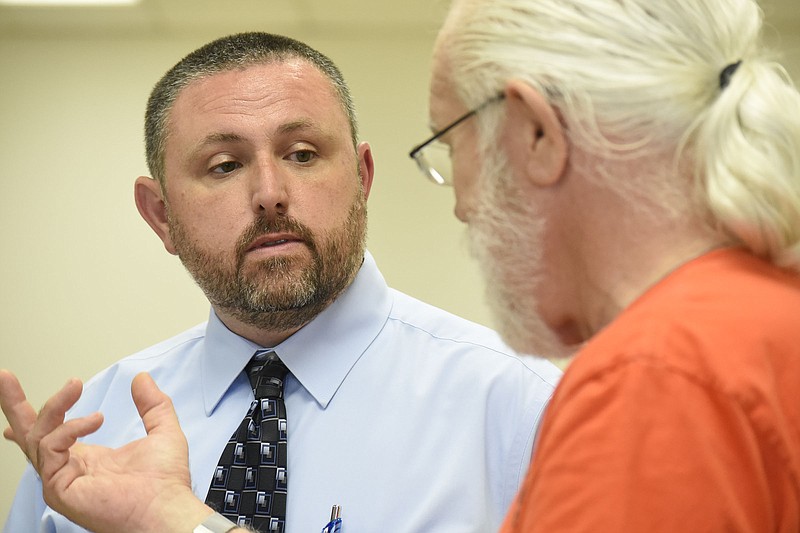Chattooga County Sheriff Mark Schrader noticed things starting to take a turn for the worse around July 20.
At the time, the county, with an estimated 25,000 people, had only seen 96 cases of the coronavirus. COVID-19 had largely been avoided in the small mill community, and area businesses appeared to settle in to the new normal.
Even so, public officials took precautions. Nursing homes, public buildings and the jail limited visitors. Schools were set to open in about 10 days but district officials felt a safe reopening was possible because COVID-19 cases were low. And they were mostly right about that.
But around July 20, a Monday, one of Schrader's deputies working at the jail expressed feeling a little under the weather.
But one rapidly turned into three.
"The number bumped up to three deputies on the same rotation all on the same shift," Schrader said Friday afternoon, reflecting on the beginning stages of the outbreak. "We got them isolated, and then it just kind of went one by one. It seemed like every day or two there would be another one that come up with a symptom or had a positive test."
In a week's time, nearly all of the 15 full-time employees at the Chattooga County Jail had either tested positive for the coronavirus or were out sick with symptoms of the virus. Schrader was scrambling to fill shifts, taking people from his administrative department and putting them on jail duty all while trying to negotiate with the jail's health care provider to get the two dozen inmates tested.
The jail started to take extra precautions when bringing in new inmates. Across town, public buildings were being closed after employees tested positive. Three judges tested positive, including Probate Judge Jon Payne - who eventually died due to complications with the virus.
Employees in the town of Trion forced the town hall there to close for a week, and two employees at the Summerville Recreation Center forced it to close.
Public meetings were postponed, the elections office in Chattooga County closed for a few days and the courthouse had to be completely cleared out. However, the outbreak at the jail turned out to be the worst of it.
"We thought we were doing pretty good for a while when we had one or two," Schrader said. "That was pretty much to be expected with all this going on. And then boom, it snowballed to what it did."
Schrader started to stagger shifts as much as he could and limited exposure, but the virus did what it does so well: it infiltrated even in an environment that seemed impenetrable.
Testing and the time to get results back also complicated the outbreak and how Chattooga County government officials could manage it. Some deputies who tested for COVID-19 got their results after three weeks. This was after they had already been quarantined for the required 14 days and had been back to work.
Because of the delay, Schrader said he still doesn't know exactly how many of his deputies officially tested positive.
In July, when the outbreak was at its worst, the jail's contracted inmate medical provider - CorrectHealth - said the inmates would not be tested unless they started to show symptoms. After a few weeks of negotiating and exploring other options, Schrader and his team figured out a way to get enough tests by using CorrectHealth and the help of local health districts.
Schrader said nine or 10 inmates ended up testing positive, which was nearly half of the inmate population at the time, but the worst symptom reported was an inmate with a runny nose.
In April, 345 people tested positive for COVID-19 at the County Correctional Complex in Pikeville, Tennessee, after testing 2,335 inmates. A few weeks later, a federal inmate who had been transferred from the Bledsoe County facility tested positive at the Hamilton County Jail. All staff and inmates were then tested in Hamilton County, and all of them were negative.
The Marshall Project and the Associated Press have been tracking inmate coronavirus cases and reported last week that 125,730 inmates had tested positive since the pandemic started. About 102,732 prisoners have recovered and 1,066 have died. Georgia ranks sixth among states with 59 inmate deaths. Tennessee has had 16 deaths.
Two Chattooga County detention officers were hospitalized after testing positive for COVID-19, and one still hasn't returned to work and will likely be out for at least another month.
"I had several that were pretty sick and some that tested positive that never had a symptom," Schrader said.
Months removed from the outbreak, Schrader said he and his staff still haven't been able to pinpoint exactly where the first positive case came from and how it started to spread.
"We tried to count backwards for the time frame but we were never able to even narrow down a specific person or a time that it could have been exposed," he said. "We feel like there were some exposures to some officials - and some had symptoms - prior to our outbreak. The detention staff normally don't have a lot of contact with those officials."
Looking back on the turn of events that caused chaos for more than three weeks at his jail and under his watch, Schrader said the biggest lesson he's learned is how adaptable, capable and impressive his staff can be in an unprecedented situation.
"We're trying to stay on top of all the guidelines but things are changing still to this day," he said. "Being very cautious and doing everything we could do, I guess we learned how to get through some pretty hard times with very minimal impact to our daily operations."
Patrick Filbin can be reached at pfilbin@timesfreepress.com or 423-757-6476.
